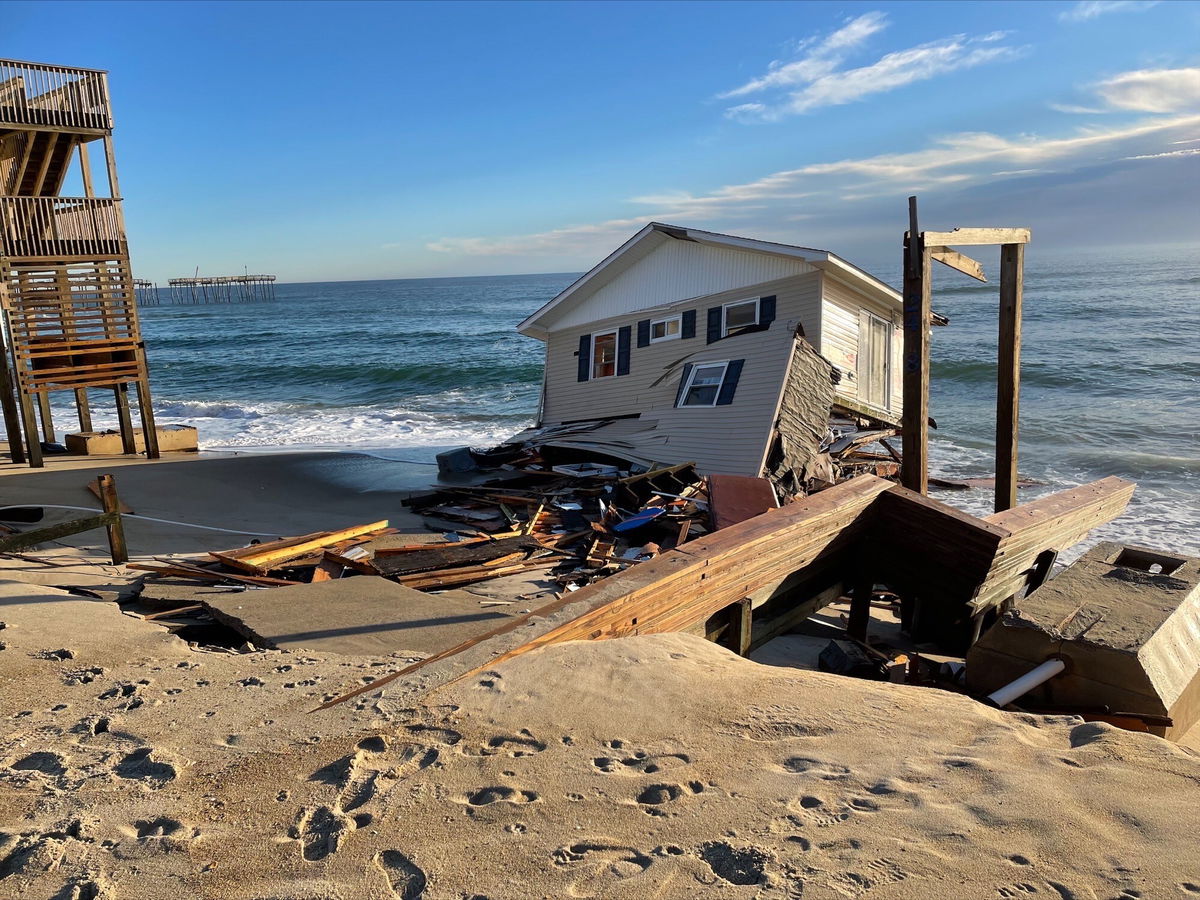A home collapsed into the ocean as rising seas eat away at the North Carolina coast

The home stood in the village of Rodanthe
By Rachel Ramirez, CNN
Another beachfront home in North Carolina collapsed into the ocean, officials with the National Park Service said Wednesday, as tides get higher and rising sea levels eat away at the coast.
High tides in Rodanthe, where the home was located, have been slightly higher than normal over the past couple of days due to persistent onshore wind. The waves are also spreading the home wreckage along the Outer Banks shoreline, according to the National Park Service.
This isn’t the first Rodanthe home the Atlantic Ocean has claimed, according to local media. In 2012, a beach house damaged by Hurricane Sandy also collapsed into the ocean; another home washed away in 2020, leaving a trail of debris along the shore.
The National Park Service also said in 2020 it was planning to relocate the Long Point Cabins in Cape Lookout National Seashore, which is south of Rodanthe, because more frequently they were being overwhelmed by high tides and hurricane storm surge.
“The NPS cannot sustain the Long Point Cabins where they are right now,” the Park Service wrote on Facebook at the time. “20 years ago, there was over 300′ of beach and dunes between the cabins and high tide. Today, there is 48′ of flat sand.”
Because of the home collapse and the associated debris, Park Service officials warned visitors to Cape Hatteras, which includes Rodanthe, to use caution when walking along the beach or engaging in any recreational activities along the shores between the villages of Rodanthe and Salvo. The Park Service said rangers are working with county officials to clean up the debris as well as remove the remnants of the home.
“The bulk of the debris is at the site of the collapsed house, located at 24183 Ocean Drive, Rodanthe,” Cape Hatteras National Seashore said on a Facebook post. “However, smaller amounts of debris have been spotted as far south as off-road vehicle ramp 23, more than seven miles away.”
The five-bedroom beach cottage was built in 1980, according to real estate records, and was listed as a vacation rental home, with a market value of $328,900.
Rising tides
While authorities have not determined the precise cause of the latest collapse in Rodanthe, scientists have showed the increasing risk coastal communities face due to sea level rise, worsening erosion and high-tide flooding.
Coastal communities in the Northeast have seen a significant uptick in tidal flooding, including around Washington, Baltimore and Annapolis, Maryland. The National Oceanic and Atmospheric Administration has noted that by 2030, there will be 7 to 15 days of high-tide flooding nationally. By 2050, the frequency increases to 25 to 75 days.
More broadly, a 2020 study found that as many as half of all sandy beaches around the world could disappear by the end of the century because of sea level rise. Even by 2050, scientists say, many coastlines could be unrecognizable compared to what people see today, with 14-15% facing severe erosion.
Sea level in this part of coastal North Carolina has risen roughly 3 inches since the early 1980s, according to NASA. Coastal erosion costs around half a billion dollars each year in the form of deteriorated structures and land that is lost to the rising ocean.
Many coastal communities in the United States experience nuisance flooding, or high-tide flooding, on a regular basis. Higher sea levels, caused by warmer water temperatures and melting glaciers and ice sheets, increase the hazards coastal homeowners are exposed to. Hurricane storm surge is creeping higher, and homes and other critical infrastructure are now exposed to saltwater and erosion that they weren’t a few decades ago.
The UN Intergovernmental Panel on Climate Change has concluded that risks associated with climate change-induced sea level rise will increase significantly along all low-lying coastal communities unless meaningful and major adaptation efforts are made. An update on that report, set to be released later this month, is expected to emphasize those projections and also show how the climate crisis is already impacting coastal communities.
The-CNN-Wire
™ & © 2022 Cable News Network, Inc., a WarnerMedia Company. All rights reserved.